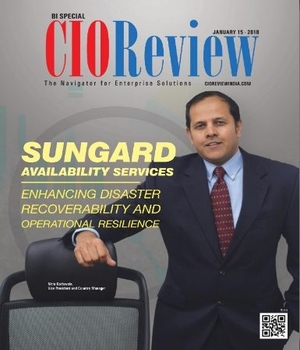
Three ESG Strategies for Sustainable Business Growth
Jyotsna Beliappa, Founder and Director, BlueSky Sustainable Business
.png) In a panel hosted by ASSOCHAM, Jyotsna Beliappa, Founder and Director of BlueSky Sustainable Business, shared her insights on the common misconceptions associated with ESG strategies and underscored how risk management is an integral element for achieving sustainable business growth. She has over 25 years of consulting experience for large corporations. Following are some of the key takeaways from her talk.
In a panel hosted by ASSOCHAM, Jyotsna Beliappa, Founder and Director of BlueSky Sustainable Business, shared her insights on the common misconceptions associated with ESG strategies and underscored how risk management is an integral element for achieving sustainable business growth. She has over 25 years of consulting experience for large corporations. Following are some of the key takeaways from her talk.
According to her, the three strategies vital for businesses to thrive are
- Risk management
- Tackling social polarization
- Avoiding one-size-fits-all strategies
ESG is often misunderstood and, at times, overused. It has become an umbrella term for almost anything, leading to a dilution of its true significance.
At its core, ESG represents a business's responsibility toward its stakeholders and the planet. However, the essence of this responsibility varies depending on an organization's maturity and context. Each business must define its own ESG priorities based on relevance and significance. For those in manufacturing or finance, like the CFOs here today, this means allocating resources wisely, ensuring that investments in ESG align with the core goals and long-term success of the business.
Innovation is vital across all three pillars of ESG—environment, social, and governance. Innovation means achieving objectives by thinking differently and solving problems in non-traditional ways. When it comes to ESG, this mindset becomes crucial because the challenges we face today, such as climate change, social inequalities, and governance failures, are complex and require fresh approaches. Governance, in particular, serves as the foundation for any successful ESG strategy. Leadership plays a decisive role in fostering innovation and driving a robust ESG agenda.
Resilience and Risk Management
Resilience and risk management are also integral to ESG. Resilience is the ability to endure strain without breaking. In today’s volatile, uncertain, and complex world, businesses are constantly under pressure. Resilience is the measure of how effectively an organization can withstand and adapt to such challenges for sustainable business growth. On the other hand, risk involves identifying and preparing for potential threats. According to the World Economic Forum, misinformation and disinformation are among the top global risks for the next two years. This underscores the need for businesses to address how technology can be both a tool for good and a vector for harm. In the age of rapid technological advancements, cybersecurity and IT strategies must account for these risks to protect businesses and maintain trust.
Tackling Social Polarization
Social polarization is another critical issue intertwined with ESG strategies. Polarization can manifest between communities, societies, and even nations, often exacerbated by misinformation. Businesses must recognize the destabilizing potential of these dynamics and build strategies that promote inclusivity and cohesion. Ignoring these risks could leave organizations vulnerable to social and political upheaval, directly impacting their resilience and sustainability.
Avoiding One-Size-Fits-All ESG Strategies
ESG, at its heart, demands innovative thinking. Solving environmental problems, for example, requires more than addressing their immediate causes. A linear approach will not suffice. We need solutions that reimagine the system entirely. The same applies to social and governance issues. ESG strategies must be tailored to the unique needs of each organization. What works for a manufacturing business will differ from the approach of a service company. Blindly adopting trends, such as pledges for carbon neutrality by 2070, without understanding their relevance to one’s business is counterproductive.
Ultimately, every organization, regardless of size, has a role to play. Whether you’re a small business, a microenterprise, or an individual, any innovative effort toward addressing ESG challenges contributes to the collective good. The key lies in staying focused on what matters most to your business and embracing a mindset of responsibility, innovation, and resilience. This is how we can meaningfully address the risks and opportunities of ESG and create a lasting, positive impact.
CIO Viewpoint
Gen AI: Transforming Cloud Solutions for...
By Matt Yanchyshyn, VP - AWS Marketplace & Partner Services, AWS
Upcoming Technological Advancements in Payments...
By Pinak Chakraborty, CIO of Airtel Payments Bank
Shaping the Future of AI: Talent, Innovation,...
By Yann LeCun, Chief AI Scientist at Meta
CXO Insights
Three ESG Strategies for Sustainable Business...
By Jyotsna Beliappa, Founder and Director, BlueSky Sustainable Business
Importance of Data Driven reporting & Decision...
By Ketan Karkhanis, Head of Information Technology, Hikal
Pursuit of Actionable Insights Driving Data...












